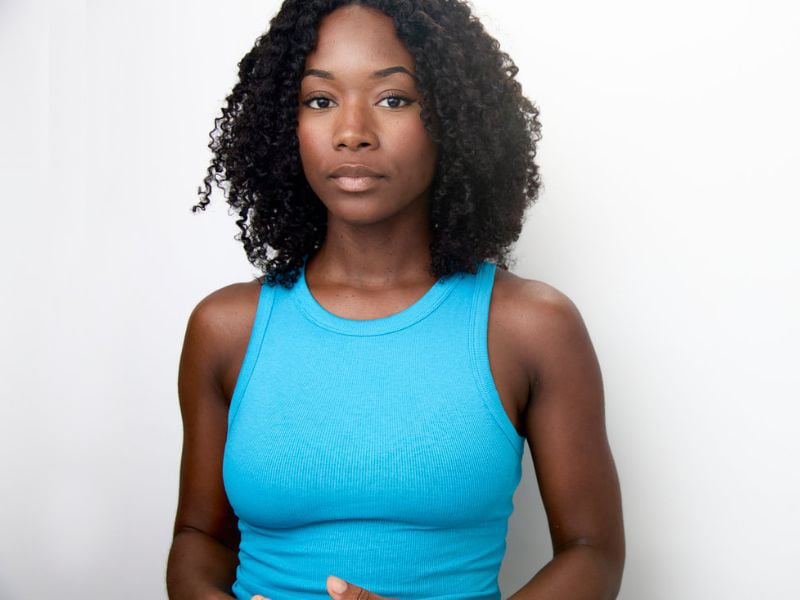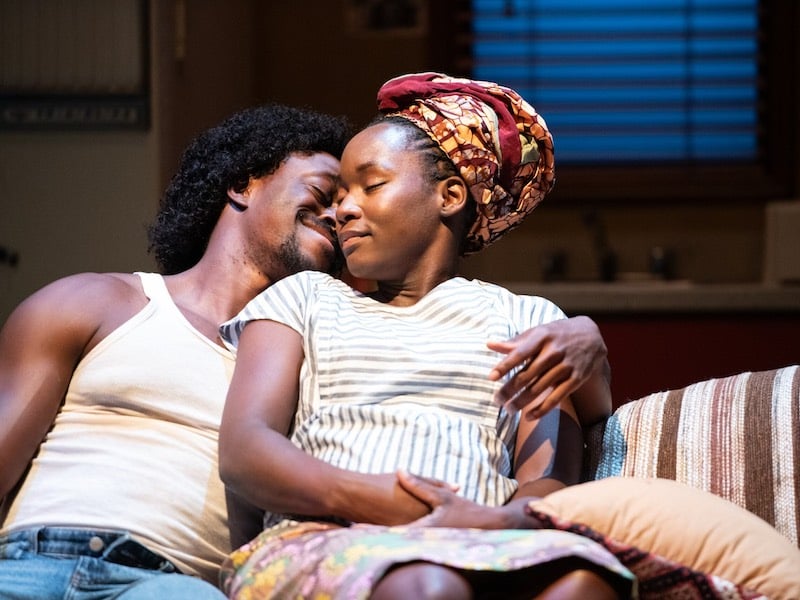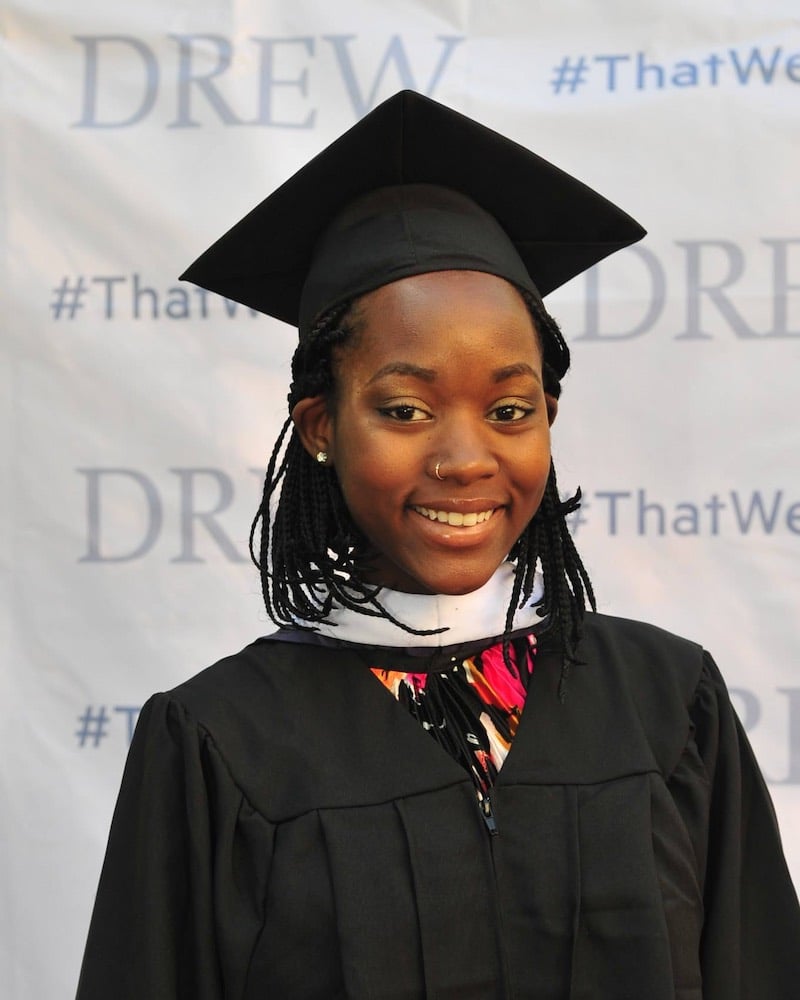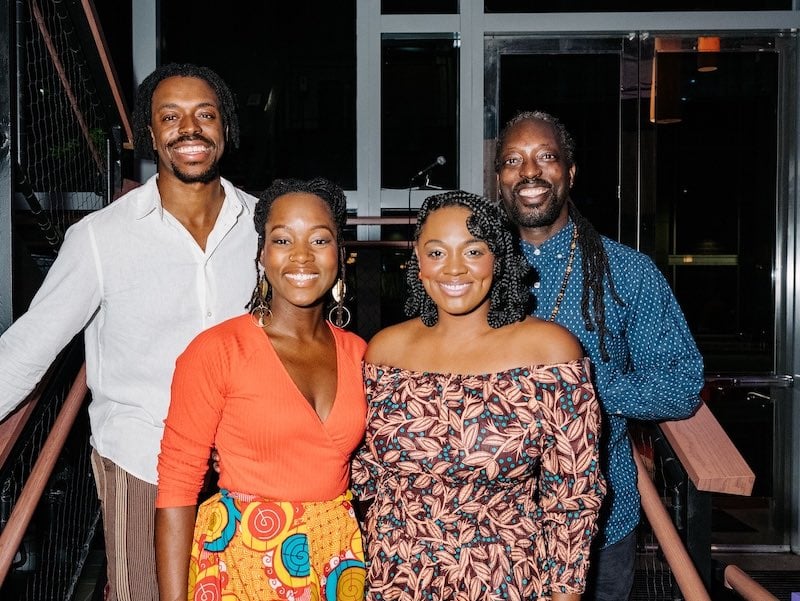By Billie Krishawn
As a Washington, DC, native, the thought of returning home has always come with reservations. Looking at family being able to proudly say they were born here, raised here, and are “still here” made me want to strive for something different. But as I wrap up my tenth year back in DC, I finally realized what my character Abasiama knew all along: there’s nothing like being home.

My name is Billie Krishawn, and I’m a native Washingtonian, full-time actor, mom, and activist. I’m currently playing the character of Abasiama in Round House Theatre’s production of Sojourners by Mfonsio Udofia. This play follows the journey of a young Nigerian woman who was sent to America to join her arranged husband as they pursue their academic career in order to come back to Nigeria and help rebuild the country post-war. Over the course of the play, the audience witnesses a very pregnant Abasiama trying to hold on tightly to her designated path while also trying to hold on to her passionately lost husband, Ukpong. Along the way Abasiama meets Moxie, a younger, fiery woman trying to fight her way out of the path that was assigned to her. Moxie and Abasiama quickly teach each other that regardless of our assigned path, the power of choice and hope can bring us to the path we know we deserve.
Amid all of the struggle and pain, the one thing that keeps Abasiama going is the promise she made before arriving in America: return home.
This story called to me so heavily because it was full of a culture I didn’t get a chance to be a part of growing up. Being an American-born Black woman with lineage here means being far removed from my origin story. With ancestors who survived slavery, the systems have intentionally separated us from our lineage. Even now, to go digging into our past it comes with a cost. With the help of Ancestry.com, I learned that I’m 34% Nigerian, 20% Cameroonian, 14% Malian, 13% Ghanaian, and 6% Beninese. I’ve learned that some of my ancestors were brought to America through Harpers Ferry, and most spent time on plantations in Virginia with a mix of plantations in the Carolinas as well. As an American, there will always be some limitations on how far back I’ll know.

In Sojourners, we witness Abasiama fighting to make sure her line never forgets where they come from or where they’re destined to go. Abasiama’s path was carved out for her from the beginning, but the journey she takes over the course of the play makes her realize that sometimes following the right path means creating our own. Similar to Abasiama, it took me a while to learn this for myself.
Years ago, my mother decided that I would audition for the theater department at Duke Ellington School of the Arts, a renowned performing-arts school based here in DC. Originally when my mother told me about the high school, I told her I wanted to go out for the vocal department. She quickly shut it down explaining that I couldn’t sing but was dramatic, so naturally acting would be the only fit. I accepted this path she carved for me, auditioned, and learned on my 15th birthday that I would be attending the arts school as a theater student.
Duke Ellington was a flurry of young artistic misfits looking to create art, make sense of life, and find ourselves in the process. To be honest, it was the first time I had been surrounded by so many like-minded Black and Brown kids in my life. The safe haven our social life and vigilant faculty provided was only one part, though. Duke Ellington was rigorous. We attended school from 8 am to 5 pm, rehearsed until 10 pm when needed, and had to re-audition each year in a process they called “Juries” in order to keep our spot at the school.
During my second year at the school, immediately after my jury, one of the celebrated teachers pulled me aside to explain during a 15-minute talk that I had “no talent, no technique, and would never be an actor.” At that time I accepted her words as part of my path, decided against applying to acting conservatories, and instead attended a small liberal college called Drew University in Madison, New Jersey. My first year there I auditioned for everything: the dance show, the mainstage theater productions, the acapella groups… the list goes on. Despite casting a wide net I didn’t get accepted into anything. As was my pattern, I accepted this unfortunate outcome and let go of my plans of becoming the performer I had trained all high school to be. Instead, I shifted my focus to writing and finding a community that looked like me despite being at a PWI (predominately white institution).
In my second year, I came across Rodney Gilbert, a colorful and creatively dressed Black professor who was loud, quick-talking, and passionate. I remember I was on the brink of tardiness waiting for my essay to finish printing. Out of the corner of my eye, I saw a wave of color pass me and then immediately re-enter the frame. A voice asked directly, “Who are you? I know every Black student here and for some reason, I don’t know you.” Little did I know, that would be the beginning of me building my New Jersey compound. Shortly after he informed me they’d be doing the school’s first Black production of for colored girls who have considered suicide/ when the rainbow is enuf by Ntozake Shange. I auditioned and it was the first thing I ever got cast in at the school. Even though the show didn’t end up getting produced, it was the beginning of gaining visibility there that allowed me to finally be considered and cast in productions. Eventually, I graduated a semester early with my bachelor’s in Theater and a minor in Creative Writing.

After completing university, I moved into the teeniest Newark apartment, trying to make my new home work; but five months later, I was moving back home to DC to live with family. When I moved to New Jersey, I never intended to come back, and for quite a few years after returning to DC, all I could think about was finding my chance to leave again. I moved back out of loneliness but returned with the shame of failing out of state. In a way, it’s the same fear Abasiama has as she starts to realize her plans in America might not be realistic. Thankfully both in my own life and in the play, Abasiama and I come to learn about the power of choice.
Little did I realize, a whole career was waiting for me back home. It started when Michael Bobbitt and Serge Seiden cast me in Jumanji at Adventure Theatre, my first professional production. Nick Martin at Constellation later cast me in my first lead role in Melancholy Play, which led to my first Helen Hayes nomination. In 2020, DC Theatre Scene hired me to write my very first article and later commissioned me to start my very own series, The SoSu series, which focused on lifting the stories of marginalized fem-presenting folks in the DC-area theater. That same year I won my first Helen Hayes award and learned that I’d soon become a mother. The following year I became the DC Chief for PAAL, the Parent Artist Advocacy League. In 2023, I started a group called The DC Theatre Community Care, which focused on building up the theater community, to expand our means of supporting and uplifting one another.

Looking back on the past ten years since returning home, I realized that for so long I thought the only choice I had was to follow the path folks were assigning me. I walked through life asking for permission to take the risks I always knew I should take. Somewhere along the way, though, I learned that “assigned paths” are only recommended routes and the only right path is the one our hearts lead us to.
I look back at what brought me to acting and realize that I was given a few tools to begin one specific project but was able to take those tools to build myself up to be the person I knew I deserved to be. If I allowed other people’s judgment to dictate where I allowed myself to go, if I allowed folks to make up rules for me to live by, if I allowed folks to convince me there was only one path to follow, who knows where I’d be now? That same journey is the journey we witness Abasiama go through in Sojourners. My character, Abasiama, learns that her assigned path is what brought her here to America but she gets to design what her journey is made up of. Even when it doesn’t look like the original blueprint, even if folks don’t agree… the path taken should always be the path that aligns with our own heart’s sound.
To follow more of Billie Krishawn’s artistic journey, visit her website, BillieKrishawn.com, or her instagram, @AbsoluteReality.
Sojourners plays through October 6, 2024, at Round House Theatre, 4545 East-West Highway, Bethesda, MD (one block from Bethesda Metro station). Performances are Tuesday through Thursday at 7:30 pm, Friday and Saturday at 8:00 pm, and Saturday and Sunday at 2:00 pm. Tickets can be purchased by calling 240-644-1100, visiting the box office, or online. (Learn more about special discounts here, accessibility here, and the Free Play program for students here.
Running Time: Approximately two hours and 30 minutes including one intermission.
View the digital program for Sojourners here.
SEE ALSO:
Round House kicks off season with Nigerian-American drama ‘Sojourners’ (news story, August 8, 2024)



